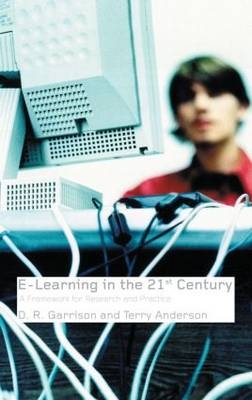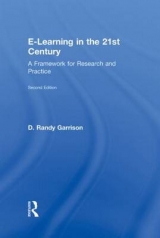
E-Learning in the 21st Century
A Framework for Research and Practice
Seiten
2002
Routledge (Verlag)
978-0-415-26345-0 (ISBN)
Routledge (Verlag)
978-0-415-26345-0 (ISBN)
- Titel erscheint in neuer Auflage
- Artikel merken
Zu diesem Artikel existiert eine Nachauflage
The growth of e-learning is described as explosive and disruptive. This book provides a framework for understanding e-learning in higher education. It provides models for educators to use to realise the potential of e-learning. It is suitable for researchers, practitioners and senior administrators looking for guidance on how to adopt e-learning.
There is currently a technological revolution taking place in higher education. The growth of e-learning is being described as explosive, unprecedented, and above all, disruptive. This timely and comprehensive book provides a coherent framework for understanding e-learning in higher education.
The authors draw on their extensive research in the area to explore the technological, pedagogical and organisational implications of e-learning, and more importantly, they provide practical models for educators to use to realise the full potential of e-learning. A unique feature of the book is that the authors focus less on the ever-evolving technologies and more on the search for an understanding of these technologies from an educational perspective.
This book will be invaluable for researchers, practitioners and senior administrators looking for guidance on how to successfully adopt e-learning in their institutions. It will also appeal to anyone with an interest in the impact of e-learning on higher education and society.
There is currently a technological revolution taking place in higher education. The growth of e-learning is being described as explosive, unprecedented, and above all, disruptive. This timely and comprehensive book provides a coherent framework for understanding e-learning in higher education.
The authors draw on their extensive research in the area to explore the technological, pedagogical and organisational implications of e-learning, and more importantly, they provide practical models for educators to use to realise the full potential of e-learning. A unique feature of the book is that the authors focus less on the ever-evolving technologies and more on the search for an understanding of these technologies from an educational perspective.
This book will be invaluable for researchers, practitioners and senior administrators looking for guidance on how to successfully adopt e-learning in their institutions. It will also appeal to anyone with an interest in the impact of e-learning on higher education and society.
Part I: Conceptual Framework 1. Introduction 2. Theoretical Foundation 3. Community of Inquiry 4. The Technology of E-Learning 5. Social Presence 6. Cognitive Presence 7. Teaching Presence Part II: Practice 8. Guidelines for Practice 9. Assessment and Evaluation 10. Organizational Issues 11. Future Directions
| Erscheint lt. Verlag | 26.12.2002 |
|---|---|
| Zusatzinfo | 6 Tables, black and white |
| Verlagsort | London |
| Sprache | englisch |
| Maße | 156 x 234 mm |
| Gewicht | 509 g |
| Themenwelt | Mathematik / Informatik ► Informatik ► Netzwerke |
| ISBN-10 | 0-415-26345-X / 041526345X |
| ISBN-13 | 978-0-415-26345-0 / 9780415263450 |
| Zustand | Neuware |
| Haben Sie eine Frage zum Produkt? |
Mehr entdecken
aus dem Bereich
aus dem Bereich
das umfassende Handbuch für den Einstieg in die Netzwerktechnik
Buch | Hardcover (2023)
Rheinwerk (Verlag)
CHF 41,85
das Praxisbuch für Admins und DevOps-Teams
Buch | Hardcover (2023)
Rheinwerk (Verlag)
CHF 55,85
das umfassende Handbuch
Buch | Hardcover (2024)
Rheinwerk (Verlag)
CHF 83,85



